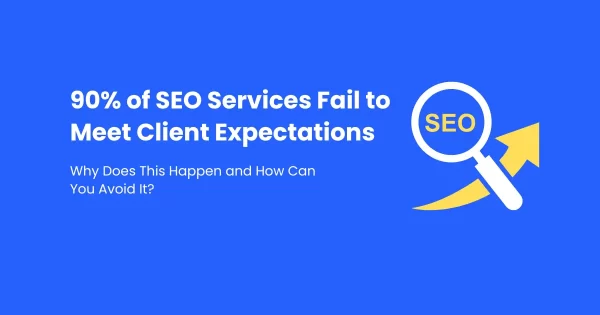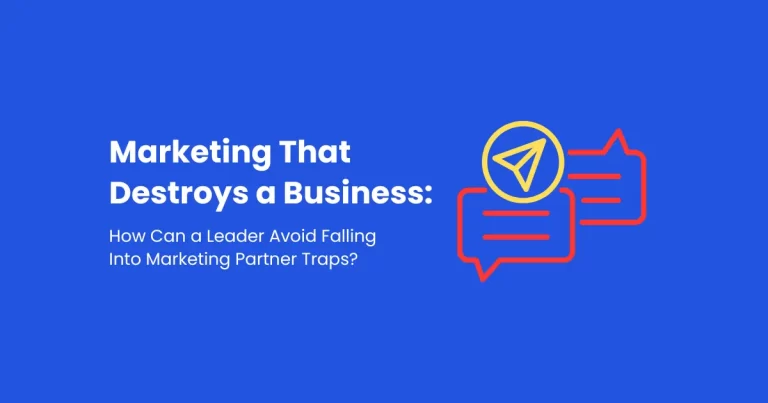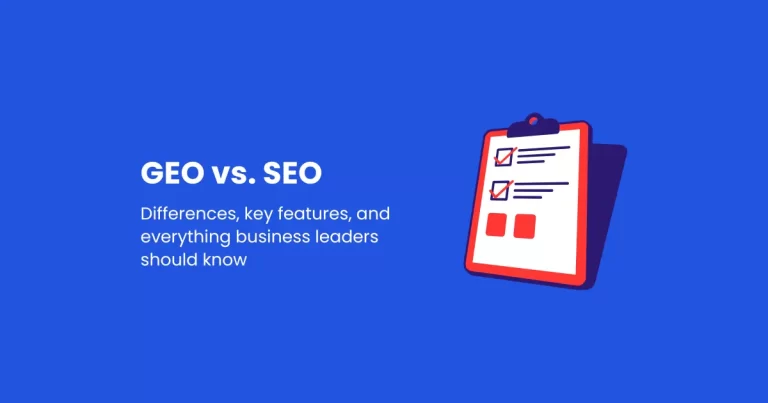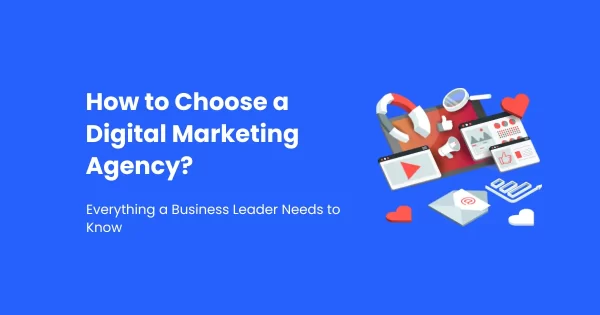Why Most SEO Services Fail — And What True SEO Effectiveness Really Looks Like

This article explores a critical problem faced by many businesses: why as many as 90% of SEO services fail to meet client expectations. It not only provides an in-depth analysis of the reasons behind this situation but also offers practical advice on how to avoid the most common mistakes and ensure a successful return on investments.
The article clearly emphasizes that the ultimate responsibility for SEO success lies with the client. It highlights the importance of having a well-defined strategy, realistic expectations, and an effective performance measurement system. Readers will learn how to recognize incompetent service providers, what questions to ask when choosing partners, and why the focus should be on sales growth rather than just keyword rankings. In addition, the article discusses alternative digital marketing tools and presents a universal SEO and Google Ads strategy that helps maximize the potential of search engines for business growth.
Below are the main topics covered in this article:
- How to Ensure SEO Effectiveness?
- The Most Common Reasons Why Ordered SEO Services Fail to Meet Client Expectations
- How to Avoid or Recover from a Series of SEO Failures
- A Universal SEO and Google Ads Strategy
- FAQ
SEO Services Fail More Often Than You Think: Here’s What True SEO Effectiveness Looks Like
How to Ensure SEO Services Effectiveness?
Have you ever purchased services that ultimately didn’t deliver? The investment didn’t pay off, the initiative disappointed, and in the end, you had to write it off as a failed decision.
Such situations are quite common. Many of our clients have, over the years, switched between several – sometimes even five – agencies, tried hiring in-house specialists, consulted external experts, yet still failed to achieve the expected results. Why does this happen? The reasons can vary: an ill-suited strategy, unclear goals, overestimated potential, or simply choosing the wrong provider.
The most important question is how to avoid these mistakes. When ordering SEO services, you must understand that the responsibility for the decision always lies in your hands. You are the one who signs the contract, chooses the provider, approves their proposals, and decides whether the price is worth the promised work.
That’s why the key question you need to ask before making a decision is this: how do you choose SEO services that bring real results – not disappointment?
Why Do SEO Services Often Fail to Meet Client Expectations?
Unrealistic Expectations for Results
SEO processes and technical fixes are often ordered based on the assumption that correcting errors will automatically increase sales.
In reality, fixing issues rarely has a direct impact on sales. The common mindset is: we’ll fix the errors on the website, add more content and backlinks – then our rankings will improve, traffic will grow, and sales will naturally increase. However, practice shows that even when businesses reach top keyword positions and experience significant traffic growth, they do not always see a clear impact on sales.
There are many possible reasons: market changes, seasonality, weather conditions, the emergence of new competitors or alternative products. Sometimes competitors capture buyers through more appealing Google Ads campaigns.
Another reason is poorly chosen keywords. Even if you rank highly, the keywords may not align with the buyer’s decision-making stage. In such cases, traffic increases, but it serves more to build awareness rather than directly drive sales.
That’s why, when evaluating SEO performance, it’s essential to consider external KPIs. Even if you cannot control them, you must measure and assess them. Only then can you truly understand the value of SEO efforts for your business and sales.
Poor Strategy – or No Strategy at All
A common mistake is treating a list of SEO technical tasks as a strategy. But a strategy is not just a to-do list. A proper strategy should carefully address the following aspects:
- A clear explanation of why these specific actions are being taken and to what extent.
- A plan showing how SEO will contribute to sales growth.
- Defined methods for measuring and evaluating results.
To achieve this, you need a solid KPI system that helps you understand not only the impact of SEO activities but also the influence of external factors. Unfortunately, SEO performance is often evaluated superficially – for example, by looking only at keyword rankings. Worse still, some measure progress by a vague “percentage increase” rather than actual improvements in key business-driving keywords.
In reality, SEO competition revolves around the top 3–5 positions, since lower rankings typically have minimal impact on sales. If you target keywords where competitors are already strong and actively defending their positions, chances are you may never outrank them. In such cases, it’s smarter to rethink your strategy – perhaps focus on other keywords or even other marketing channels.
It’s easy to find ways to boast about SEO results, but the most important question for a business leader is this: do you actually feel sales growth? And is that growth really the result of SEO – or other factors?
As with all digital marketing, when evaluating SEO, it’s essential to track not just the current state (“before vs. after”), but also KPI trends over time – how, when, and in which direction metrics change across days, weeks, months, or even hours. This is the only way to understand what caused the changes and why.
So ask yourself: does your business KPI system simply show numbers, or does it explain the reasons behind them?
When SEO Decisions Are Made by Executives: Where Does the Risk Lie?
As mentioned earlier, the decision to order SEO services is usually made by company executives. Unfortunately, in many cases, they have only limited knowledge of processes. This often means that anyone with even slightly more SEO familiarity may appear to them as a “great specialist.” As a result, it becomes much harder to objectively evaluate strategies, KPIs, workload, or pricing.
Frequently, SEO decisions are based on recommendations or reviews. However, most of these are subjective and vague, for example: “Great specialists,” “True professionals,” “Very satisfied.” Such feedback rarely provides concrete facts or measurable results. Moreover, some public Google reviews are not even related to SEO services, which raises the question: how genuine are these evaluations, and do they truly reflect service quality?Another issue is the shifting of responsibility within the organization. Employees, wanting to avoid accountability, often present executives with a few supplier options and leave the final decision to them: “It’s your business, your money.”While technically true, this is in fact a critical choice—one that should ideally be made by experienced marketers, after carefully analyzing market trends, pricing, SEO agency competence, and, of course, the competitive landscape.
How to Avoid or Recover from SEO Failures?
One Solution – Consult Independent Specialists
In the SEO field, 2–4 years of experience is often still considered limited. This is especially true if a specialist has worked only in one or a few companies, within a single industry. Such experience may bring deeper specialization, but it usually doesn’t provide a broader understanding of different SEO contexts. It’s also important to know whether the person worked on SEO daily or only occasionally, and whether they focused on strategic decision-making or were mainly task executors.
When hiring experts, it’s advisable to seek independent digital marketing specialists who have experience across multiple processes, not just SEO. They can help you identify which actions will actually bring value to your business – and those actions might not always be SEO-related. Even if it is ultimately the right choice, such specialists are able to objectively assess proposals and advise you on how to ensure better results.
Don’t Limit Yourself to Just a Few Providers
You can never know in advance which provider will be the most beneficial for your business at a given time. That’s why it’s important to understand the range of alternatives and have criteria grounded in solid arguments.
Consider different options – from freelancers to specialized or even full-service digital agencies. The worst decision a business can make is choosing only one option simply because it’s a familiar face or a relative.
Avoid rushing to request commercial proposals. A proposal without a clear understanding of your situation is usually just a list of tasks, which may not solve your actual problems or meet your expectations. Instead of asking for a price, ask for an overview of your situation and a vision. A good provider should clearly explain what should be done, why it should be done, and how it will be implemented. If they cannot back up their recommendations with solid arguments, it’s a sign they may lack the necessary expertise.
SEO Services Fail — and How Focusing on Sales, Not Just Rankings, Fixes It
Distinguishing Between Inexperienced Specialists and True Professionals.
It’s not difficult to tell inexperienced SEO specialists apart from professionals – the key is knowing what to pay attention to and what questions to ask.
Inexperienced specialists usually see everything in overly simplistic terms. They tend to talk about keywords, rankings, “achievements,” or client testimonials. You’ll often hear them ask: “Which keywords would you like to rank higher for?”Such providers usually perceive their work as task execution rather than a strategic process.
An experienced specialist, on the other hand, understands that keyword selection is only one part of a broader strategy – one that requires knowledge, experience, effort, and time. The most popular keywords are not always the best choice; in fact, they can often become the very reason for failure.
- Inexperienced specialists will usually rush to convince you that SEO is essential for everyone.
- A true professional, however, knows that is not always the right solution for every business and that the answer is rarely straightforward. Sometimes, the real issue lies elsewhere.
When evaluating an SEO provider, ask:
- How likely is it that implementing SEO will increase our sales?
- Why do you think so?
- What guarantees can you offer?
- What risks are involved?
- How do you plan to manage those risks?
It’s also worth asking: “How long would it take to at least meet our baseline expectations?”
This question helps you gauge whether it’s realistic to expect interim results and whether it might be wiser to invest in other channels that can deliver tangible benefits faster.
Consider Alternative Digital Marketing Channels When SEO Services Fail
No digital marketing channel is inherently good or bad. SEO, Google Ads, Meta Ads, social media marketing, or any other channel can be the right solution — it all depends on the situation. Therefore, it’s essential to carefully evaluate which tools or combinations of tools will best help achieve your specific business goals at a given time.
We often hear phrases like: “This channel doesn’t work for our business — we tried it, and it didn’t deliver results.” Such thinking is flawed because it closes the door to revisiting the same channel under better conditions in the future. In most cases, the issue lies not with the channel itself but with how it was used — poor timing, the wrong strategy, or mistakes in execution.
Every time you plan your marketing actions, consider all digital marketing alternatives. Sometimes, a well-crafted Meta Ads strategy can deliver more value than SEO. That’s why, before making a decision, you should always objectively evaluate all available options and set clear priorities.
When SEO Services Fail: A Universal SEO and Google Ads Strategy That Drives Results
There is one strategy that almost always works — but only when your potential customer is actively searching for your product on a search engine. In such cases, both SEO and Google Ads become your best digital marketing allies. If your budget allows, it’s worth investing in both channels. If not — how do you decide which one to prioritize?
You should prioritize SEO if:
- your product is relatively unique and competition is low;
- you see few or no paid ads appearing in search results for your target keywords.
In this situation, there’s a high chance you’ll quickly achieve strong organic rankings and attract website traffic. However, keep in mind that this still doesn’t guarantee sales. Once a competitor starts running paid ads, your organic traffic may decrease significantly.
You should prioritize Google Ads if:
- competition in your market is high;
- you see many active competitor ads;
- your competitors’ websites are strong from an SEO perspective.
In this case, start with Google Ads — it will allow you to compete for customer attention more quickly.
The Most Important Thing – Solid Foundations
First and foremost, make sure your analytics (Google Analytics) are properly configured so you can track key events on your website. Without accurate data, your entire strategy can collapse — you won’t be able to measure which keywords actually generate sales.
Step One – Identify the “Sellers”
At the initial stage, use an exploratory strategy:
- allocate the maximum allowed budget,
- expand your keyword list with broad match combinations,
- run both traditional keyword-based search campaigns and Performance Max campaigns.
Although clients — and sometimes even specialists — often claim to “know exactly” which keywords matter most, practice shows that they’re almost always wrong. Users search in a wide variety of ways, often using unexpected word combinations you would never think of.
With Google Ads, you can quickly identify the real “sellers” — the keywords that generate the highest revenue. Only then is it worth incorporating them into your SEO strategy.
The main KPI at this stage is revenue generated by each keyword (ranked from highest to lowest). In addition, this process helps you identify irrelevant keywords — those unrelated to your products — which should be added to the negative keyword list to ensure your budget is used as efficiently as possible.
Read Google Search Engine Optimization (SEO) Starter Guide here
FAQ
What are the most common mistakes companies make when choosing an SEO service provider?
- Lack of a clear digital marketing strategy.
SEO is chosen randomly, without a clear plan defining how it will contribute to business goals. - Not considering alternative solutions.
SEO is treated as the only option, even though other channels (such as Google Ads, Meta Ads, or partnerships) might be more effective. - Choosing based on price.
This is one of the biggest mistakes — price should be evaluated last, after assessing strategy, experience, and competence. - Considering only one or a few providers.
This limits perspective and prevents comparing different approaches and methodologies. - Using poor evaluation criteria.
The focus is often on keyword rankings or cost, rather than the real impact on sales. - Ignoring competitor activity.
Many overlook that competitors may be far more active and investing heavily in SEO or other channels. - Overconfidence in internal capabilities.
Companies assume their internal knowledge is enough, while often lacking experience or a broader market perspective. - Not verifying the provider’s reliability and competence.
- Many rely only on surface-level reviews instead of evaluating actual, measurable results.
How can you tell if your SEO service provider is truly working in your business’s best interest?
- If the process is focused on increasing sales, takes into account costs, and is based on a well-reasoned action plan – most likely yes.
- If all activities are limited merely to improving keyword rankings – that’s questionable.
How to ensure that your SEO strategy aligns with your business goals and growth?
There is no single answer – it all depends on your objectives.
- If the goal is brand awareness, the SEO strategy will focus on one set of keywords, with the main KPI being the reach of the audience achieved.
- If the goal is sales growth, the focus shifts to different keywords, and the key KPI becomes the revenue generated from organic search and its trend over time.
What practical steps can help you avoid ineffective SEO services?
- Don’t rush into purchasing SEO services.
- Consult with several independent specialists.
- Ask the agency to justify why your business actually needs SEO.
- Critically evaluate client reviews and demonstrated expertise.
- Choose providers whose results and achievements can be verified.
What does SEO look like today? How is this field evolving?
Artificial intelligence is influencing SEO, but the core principles remain the same. Today, there’s a lot of discussion about how to appear in AI model responses (such as ChatGPT or Gemini). Essentially, it’s still SEO — only with adjusted strategies, since these models learn from the content available online.
Google is integrating Gemini’s responses directly into search results — the form of information delivery is changing, but the goal remains the same. Good SEO ensures that your content is visible both in traditional search results and in AI-generated answers.
Is it still worth investing in SEO?
Yes — but it depends on the circumstances.
- If SEO strategy is the most effective tool for achieving your goals, then it’s worth the investment.
- However, if other channels (such as social media or traditional marketing) deliver better results, they should take priority.









